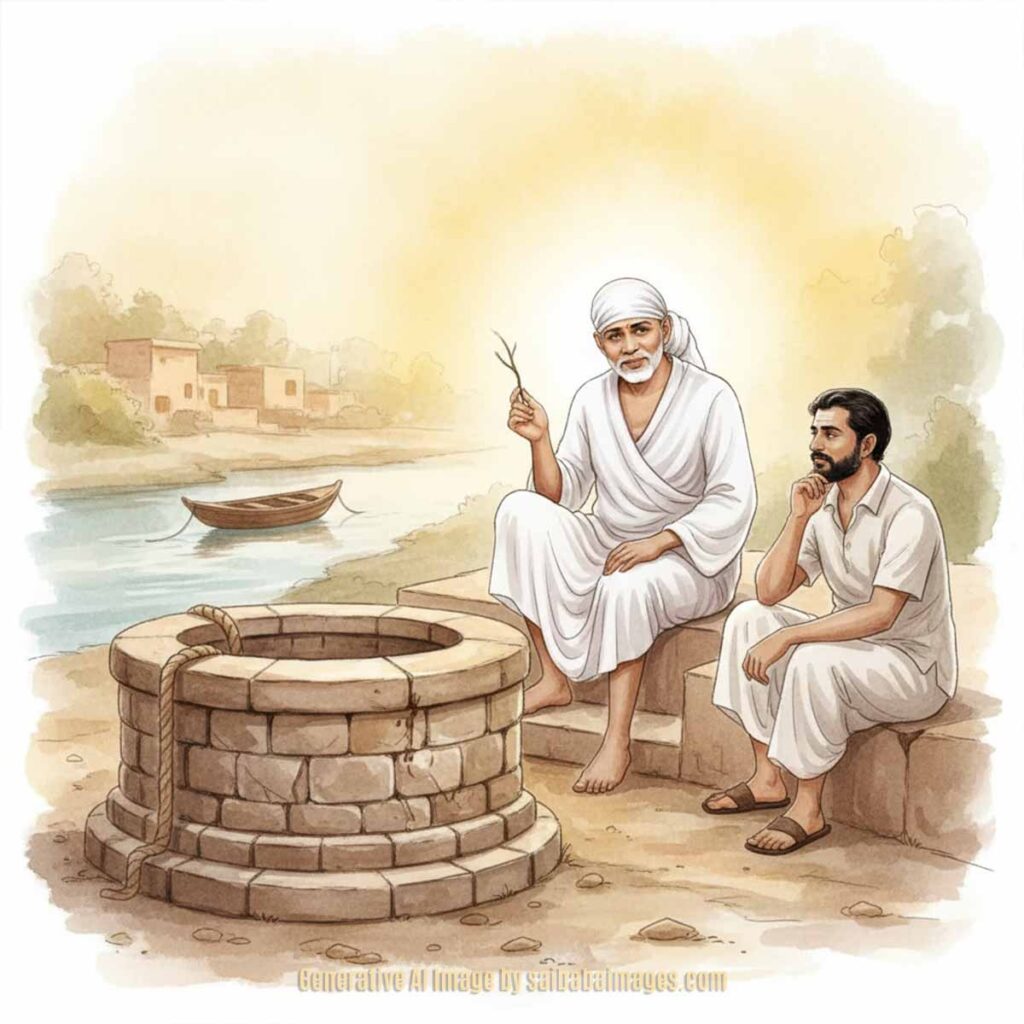
Fate has always been a subject of deep curiosity, with people questioning whether life is pre-written or shaped by their own actions. In this post, Sai Baba Answers on Fate through parables, metaphors, and guidance. The traveller’s questions mirror the doubts many of us hold, making Baba’s wisdom both timeless and relatable. Through vivid examples of seeds, rivers, and boats, Baba unfolds perspectives on destiny, karma, and free will inviting readers to reflect deeply on their own beliefs.
Why Do People Believe in Fate So Strongly?
Our traveller sat on the stone steps of the village well, staring at the rope marks etched into its rim from years of pulling water. The cool morning breeze carried the distant sound of temple bells, blending with the rhythmic creaking of a wooden cart passing by.
Yet another question had been troubling him for days.
People spoke of Fate as if it were a script written long before they were born as if their joys and sorrows were already carved into stone. Some accepted it with devotion, others with despair.
But was fate truly unchangeable? Or did people believe in it simply because they feared uncertainty?
Our traveller looked up and saw Shirdi Sai Baba sitting nearby, His gaze resting on the vast sky. A gentle smile played on His lips, as if He already knew the unspoken thoughts in the traveller’s heart.
“Baba,” the traveller finally asked, “why do people believe in fate so strongly? Is everything already written, or do we have a choice?”
Sai Baba picked up a small, dried twig from the ground and twirled it between His fingers.
“Tell Me, child,” he said, “if a farmer plants a mango seed, what will grow?”
“A mango tree, Baba.”
Baba nodded, placing the twig beside him.
“And if he plants a neem seed?”
“A neem tree, Baba.”
Baba’s eyes twinkled.
“So, is it fate that the mango tree bears sweet fruit and the neem tree bears bitterness? Or is it simply the result of the seed that was planted?”
The traveller’s heart quickened.
“It is the seed, Baba, not fate.”
Baba smiled gently.
“Ah, but do all farmers remember what they planted?”
Fate or the Consequence of Past Actions?
Our traveller frowned, trying to grasp Baba’s words.
“Baba, are You saying fate is just the result of our past actions?”
Baba said, “People call it fate because they do not remember the seeds they have sown. They see the tree but forget the planting. They see the fruit but forget the labor that brought it. When a man faces difficulty, he cries, ‘It is my fate!’ But when he enjoys success, does he call it fate, or does he take credit for his own hard work?”
The traveller felt as if Baba’s words were opening a door in his mind.
“Then, Baba, fate is not something forced upon us, but something we create?”
Baba smiled, His voice filled with warmth.
“Yes, child. Fate is not a chain around your feet, it is the shadow of your own steps. Walk in the light, and your shadow will follow. Walk in darkness, and your shadow will still follow. But in both cases, you are the one walking.”
Why Do People Believe in Fate?
The traveller took a deep breath, feeling both awe and unease.
“But Baba, why do people believe in fate so strongly if they are the ones creating it?”
Baba looked toward the ancient well, the rope hanging still over its stone mouth.
“Because believing in fate is easier than accepting responsibility. A man who believes his suffering is ‘written’ does not feel the need to change his actions. A man who believes his success is ‘destined’ does not recognize the efforts of those who helped him reach it. Fate comforts the fearful, but it blinds the seeker.”
The traveller looked down, his fingers tracing the edge of the step he sat upon.
“Then, Baba, if we are the creators of our fate, can we change it?”
Baba stood up and walked to the well, gripping the rope and pulling up a small bucket of water.
“Look at this well, child. If you drop a stone into it, can you stop it halfway?”
“No, Baba, once it falls, it must reach the bottom.”
Baba nodded.
“That is past karma. What has been done cannot be undone. But tell Me, can you stop yourself from dropping another stone?”
The traveller’s eyes widened.
“Yes, Baba, I can.”
Baba smiled, handing him the bucket of water.
“Then tell Me, child, which is more powerful, what is already done, or what you choose to do next?”
The traveller’s heart swelled with realization.
“The choice I make next, Baba.”
Baba’s gaze softened.
“That is where freedom lies, child. Fate may be the shadow of the past, but it is not the master of the future. The Sufis say, ”The river does not ask where it came from, it only chooses where to flow.’ Your past may have brought you here, but where you go next, that is in your hands.”
A Logical Example: The Boat and the Current
Baba pointed to a small boat tied near the riverbank.
“Imagine a boat floating on the river. If it moves with the current, will it reach the ocean?”
“Yes, Baba, eventually.”
“And if the boatman rows against the current, can he change his direction?”
“Yes, Baba, but it will take effort.”
Baba’s eyes shone.
“This is fate. The river’s current is your past actions, but the oar is in your hands. If you surrender and drift, you will go where the current takes you. But if you row with wisdom, you can change your course. Those who believe in fate without effort are like the boatmen who throw away their oars and blame the river.”
The Answer
People believe in fate because it relieves them of responsibility or guilt. But Vedanta teaches that fate is not a fixed script, it is the result of past actions. Sufi wisdom reminds us that we are not bound by the past unless we refuse to wake up to our own choices.
What is done cannot be undone, but what you do next is always in your hands.
A Final Thought
If a tree bears bitter fruit, is it cursed by fate, or did someone plant the wrong seed?
And if the river flows toward the ocean, should the boatman drift, or pick up his oars?
Perhaps the real question is not “Is fate real?” but “Are you willing to change its course?”
Contributed by: Murali P K – Author of Shirdi Sai Baba – The Guiding Light for the New Age (Volume 1)
Recently, we conducted a poll on the Sai Yug Network’s WhatsApp Channel asking which day you’d love to read Divine Talk articles and the response was overwhelming! Thursday emerged as the clear favorite.
So, dear reader, every Thursday, make sure to visit https://shirdisaibabastories.org/ for your weekly spiritual dose.
We would also love to hear your reviews, share your thoughts with us, so we may continue this beautiful exchange of wisdom and devotion.
Posts in this Series
1️⃣ Sai Baba Answers About Human Suffering
2️⃣ Why Is God Worshipped in Different Forms?
3️⃣ Existence and Reality – Sai Baba Answers
4️⃣ Why Does the Universe Seem Fine-Tuned for Life?
5️⃣ Is There Life Beyond Earth? Sai Baba Answers
6️⃣ Sai Baba on The Unseen Laws of the Universe
7️⃣ Sai Baba on Consciousness Beyond Science
8️⃣ Sai Baba Answers – Consciousness Beyond Death
9️⃣ Sai Baba Answers on Near Death Experiences
🔟 Sai Baba Answers on Spiritual Experiences and Parallel Worlds
1️⃣1️⃣ Sai Baba Answers – Can We Talk To The Dead
1️⃣2️⃣ Sai Baba Answers On Recurring Dreams
1️⃣3️⃣ Sai Baba Answers on Knowing God
1️⃣4️⃣ Sai Baba Answers on Kindness to Animals
1️⃣5️⃣ Sai Baba Answers on Birth and Death Cycle
1️⃣6️⃣ Sai Baba Answers on Destiny
1️⃣7️⃣ Sai Baba Answers on Universal Purpose
1️⃣8️⃣ Sai Baba Answers on Karma




Why I am having low self-esteem